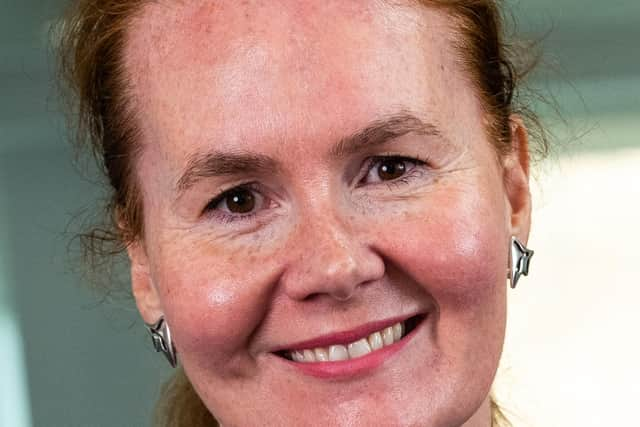Scotland's qualifications system must meet the needs of learners and the labour market, both now and in the future - Fiona Robertson
Everyone working in Scottish education wants our young people to succeed and to move on to the next stage of their lives with confidence.
Given the levels of disruption caused by the pandemic, it has remained vital that the education system works together to ensure an appropriate balance between learning, teaching, and assessment in National 5, Higher and Advanced Higher courses.


Advertisement
Hide AdAdvertisement
Hide AdThe National Qualifications 2021 Group, that includes teachers, school leaders, directors of education and learner and parent representatives, is at the centre of that co-operation and collaboration. The group has met weekly since October last year to develop the alternative certification model now in place, and agree the communications and guidance that supports it, while navigating through the changes in restrictions that have impacted on all parts of society.
A key principle in the awarding of qualifications in any year is that a learner’s grade is based on the evidence of their skills and knowledge of a course. That is really important and we know that colleges, universities and employers want to see that. Based on that evidence and an understanding of standards, teachers and lecturers can use their professional judgement to determine results. This is supported by a range of checks at a national and local level, to help ensure that an A grade in Aberdeen or Elgin is the same as an A grade in Galashiels or Arran, and so on.
Crucially, this year teachers and lecturers have the necessary flexibility to support their learners, whom they know best. That means they have choices about when and how assessments are undertaken, within a framework they are familiar with. Teachers and lecturers have been gathering evidence in a variety of ways throughout the course of the year. Teacher professional judgement is central to the approach, based on evidence.
Recognising the challenging circumstances of this year and their impact on young people, the National Qualifications 2021 Group has taken several steps to address the disruption, including extending the deadline by which schools, colleges and training providers can submit their evidence, meaning that as much time as possible is available for teaching and learning, which must always come first. We have also created a later certification opportunity for learners who, through no fault of their own, have had their learning and teaching unduly disadvantaged by severe disruption – for example by medical conditions, bereavement, self-isolation, or shielding – and have not been able to complete all their evidence by the end of term.
Everyone is working hard to deliver the right results, first time but it is also important that a direct right of appeal is available, and the appeals service is the final essential part of the approach to certification. This year, for the first time, learners will have the opportunity to appeal directly to SQA for free. That is a major change and a direct response to the consultation we ran. Some young people have expressed concern that their grade could go down as a result of an appeal. Appeals most commonly result in no change of grade, because young people do get the right results first time. However, it is an important principle every year that a grade is based on the evidence. Downgrades are rare.
Learners will be able to register that they want to appeal with SQA, and we will give priority to those waiting on their grades for either a college or university place, or job or training offer, as we do every year. Advice will still be available to learners from their school or college, to inform this decision.
I fully understand the concerns and anxiety of learners and parents at this time, and after such a challenging year. Our advice, particularly at this time of year, is for learners or parents to speak to the school, college or training provider in the first instance if they have concerns. They play an important role in communicating the approach being taken, to suit individual circumstances, including any special assessment arrangements.
Together with partners across education, we are also providing resources to help answer learner questions about their next steps and their options. This includes health and wellbeing organisations to support young people at this time.
Advertisement
Hide AdAdvertisement
Hide AdOur focus just now is on supporting our young people to get the qualifications they deserve this year – and to ensure the envelopes dropping through the letterbox on 10 August represent a fair reflection of their achievements. However, the experience of the pandemic has raised legitimate questions about the model of learning and teaching in our schools and colleges - and the assessment and qualifications which support that.
The Cabinet Secretary for Education and Skills has confirmed that the OECD Review of Curriculum for Excellence will be published later this month, with a further report on assessment and qualifications in the early autumn. In anticipation of that, the Scottish Government has announced its intention to reform Education Scotland and SQA.
As chief examiner, I welcome this. We must ensure that our qualifications system meets the aspirations of Curriculum for Excellence and the needs of learners and the labour market, both now and in the future.
Fiona Robertson is chief executive/chief examiner at the Scottish Qualifications Authority
A message from the Editor:
Thank you for reading this article. We're more reliant on your support than ever as the shift in consumer habits brought about by coronavirus impacts our advertisers.
If you haven't already, please consider supporting our trusted, fact-checked journalism by taking out a digital subscription.
Comments
Want to join the conversation? Please or to comment on this article.
